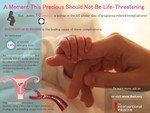 Photo by rawpixel on Unsplash
Photo by rawpixel on Unsplash
In every country and community worldwide, pregnancy and childbirth are momentous events representing a time of great joy in the lives of women and families, but also intense vulnerability. Worldwide, over 300 000 women die due to complications of pregnancy and childbirth with most of the deaths occurring in sub-Saharan Africa and India subcontinent.
Postpartum haemorrhage (PPH) – unchecked uterine bleeding after childbirth - accounts for majority of these deaths. For every woman who dies of pregnancy-related causes, 20 to 30 others experience acute or chronic morbidity. Generally, blood loss at delivery is under estimated. Primary postpartum haemorrhage (PPPH) is the loss of 500 ml or more of blood within the first 24 hours after delivery of a baby. It accounts for over 80% of postpartum haemorrhage. Preventing PPH is an important step in reducing maternal deaths. PPH usually occurs unexpectedly but can be prevented and promptly managed by simple and cost-effective evidence-based prevention plans and intervention including active management of the third stage of labour (AMTSL).
Despite the rich evidence of the benefits of appropriate management of labour in reducing PPH, yet many women do not receive this management due to poor adherence to standards. This creates a chasm between potential benefits of current knowledge and what is obtainable in most health facilities. Factors causing poor adherence have been identified and include incorrect performance of AMTSL, challenges with maintaining cold chain requirements of the uterotonic drugs, inadequate human resources, lack of written protocol for the management of labour, and poor monitoring, analysis and dissemination of measures to guide continuous improvement.
This project was carried out in a private hospital in Nigeria was able to achieve over 50% reduction in the incidence of postpartum haemorrhage using quality improvement approach. In addition, there were reduction in the rates of perineal tear and episiotomy during the same period.
